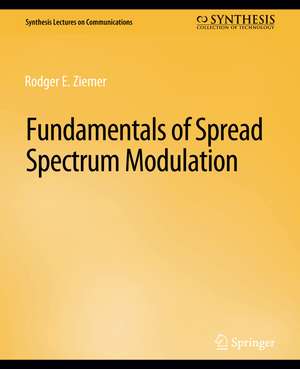Fundamentals of Spread Spectrum Modulation: Synthesis Lectures on Communications
Autor Rodger E. Ziemeren Limba Engleză Paperback – 31 dec 2007
Din seria Synthesis Lectures on Communications
-
 Preț: 373.23 lei
Preț: 373.23 lei -
 Preț: 421.93 lei
Preț: 421.93 lei - 15%
 Preț: 404.10 lei
Preț: 404.10 lei -
 Preț: 266.92 lei
Preț: 266.92 lei -
 Preț: 192.41 lei
Preț: 192.41 lei -
 Preț: 206.29 lei
Preț: 206.29 lei -
 Preț: 263.06 lei
Preț: 263.06 lei -
 Preț: 262.47 lei
Preț: 262.47 lei -
 Preț: 261.53 lei
Preț: 261.53 lei -
 Preț: 262.09 lei
Preț: 262.09 lei -
 Preț: 319.59 lei
Preț: 319.59 lei -
 Preț: 260.77 lei
Preț: 260.77 lei -
 Preț: 204.56 lei
Preț: 204.56 lei -
 Preț: 205.15 lei
Preț: 205.15 lei -
 Preț: 361.58 lei
Preț: 361.58 lei
Preț: 206.29 lei
Nou
Puncte Express: 309
Preț estimativ în valută:
39.47€ • 41.32$ • 32.66£
39.47€ • 41.32$ • 32.66£
Carte tipărită la comandă
Livrare economică 07-21 aprilie
Preluare comenzi: 021 569.72.76
Specificații
ISBN-13: 9783031005466
ISBN-10: 3031005465
Pagini: 79
Ilustrații: V, 79 p.
Dimensiuni: 191 x 235 mm
Greutate: 0.17 kg
Editura: Springer International Publishing
Colecția Springer
Seria Synthesis Lectures on Communications
Locul publicării:Cham, Switzerland
ISBN-10: 3031005465
Pagini: 79
Ilustrații: V, 79 p.
Dimensiuni: 191 x 235 mm
Greutate: 0.17 kg
Editura: Springer International Publishing
Colecția Springer
Seria Synthesis Lectures on Communications
Locul publicării:Cham, Switzerland
Cuprins
Introduction.- Review of Basic Digital Modulation Techniques.- Types of Spread Spectrum Modulation.- Spreading Codes.- Code Acquisition and Tracking.- Performance of Spread Spectrum Systems Operating in Jamming—No Coding.- Performance of Spread Spectrum Systems Operating in Jamming with Forward Error Correction Coding.- Performance in Multiple User Environments.- Summary.- References.
Notă biografică
Rodger E. Ziemer received the BSEE, MSEE, and Ph.D. degrees from the University of Minnesota in 1960, 1962, and 1965, respectively. After serving in the U.S. Air Force from 1965 to 1968, he joined the University of Missouri–Rolla in 1968 where he stayed until 1983, having been promoted through the ranks to Professor. He joined the Electrical and Computer Engineering (ECE) Department of the University of Colorado at Colorado Springs (UCCS) in January 1984 where he was Professor and Chairman of ECE until 1993 and then Professor from September 1993 till now. In August 1998, he went on leave to the National Science Foundation where he served as Program Director for Communications Research until August 2001, and then returned to UCCS. He has spent intermittent periods on leave or sabbatical to various universities and industrial concerns, including Motorola Government Electronics Group in 1980–81 and in 1991, Motorola Corporate Research Laboratories in the summer of 1995, Motorola Cellular Infrastructure Group Applied Research Laboratories in the summer of 1997, University of California at San Diego in February 1998, and Virginia Technical and State University in June 1998. He was also a Visiting Professor, Iasi Polytechnic Institute, Iasi, Romania, May–June 1993, and again in May–June 1996, from which he received a Doctorate Honoris Causa. He has published several papers in his areas of research interest, principally in digital communications. He has authored and co-authored several books, including Introduction to Digital Communications (2nd ed.), Prentice Hall, 2001 (with R. L. Peterson), Signals and Systems: Continuous and Discrete (4th ed.), Prentice Hall, 1998 (with W. H. Tranter and D. R. Fannin), Principles of Communications: Systems, Modulation, and Noise (5th ed.), John Wiley & Sons, 2002 (with W. H. Tranter), Introduction to Spread Spectrum Communications, Prentice Hall, 1995 (with R. L. Peterson and D. Borth), and Introduction to EngineeringProbability and Statistics, Prentice Hall, 1997.
